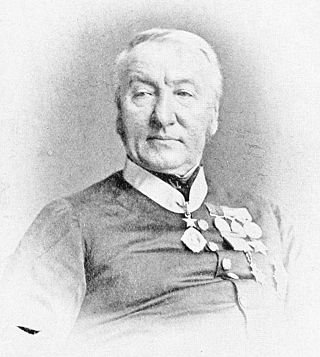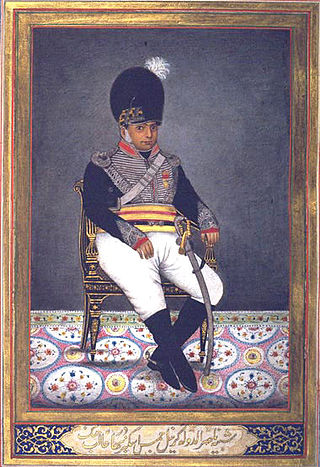Charles Chapman | |
|---|---|
| Died | 2 August 1795 |
| Allegiance | |
| Service/ | British Army |
| Rank | Colonel |
| Commands held | Indian Army |
Colonel Charles Chapman (died 2 August 1795) was Commander-in-Chief, India.
Charles Chapman | |
|---|---|
| Died | 2 August 1795 |
| Allegiance | |
| Service/ | British Army |
| Rank | Colonel |
| Commands held | Indian Army |
Colonel Charles Chapman (died 2 August 1795) was Commander-in-Chief, India.
Educated at Balliol College, Oxford, [1] Chapman served as commanding officer of the 3rd European Regiment [2] in Bengal before becoming Commander-in-Chief, India in December 1773. [3]
He became discredited as an elderly officer whose chief aim was to recoup his gambling losses [4] and was forced from office in January 1774. [3] He retired to Bath [5] and died in 1795. [6]

Field Marshal Hugh Gough, 1st Viscount Gough, was an Irish officer of the British Army. After serving as a junior officer at the seizure of the Cape of Good Hope during the French Revolutionary Wars, Gough commanded the 2nd Battalion of the 87th Regiment of Foot during the Peninsular War. After serving as commander-in-chief of the British forces in China during the First Opium War, he became Commander-in-Chief, India and led the British forces in action against the Marathas defeating them decisively at the conclusion of the Gwalior campaign and then commanded the troops that defeated the Sikhs during both the First Anglo-Sikh War and the Second Anglo-Sikh War.

Field Marshal Sir Patrick Grant, was a senior Indian Army officer. He fought at the Battle of Maharajpore during the Gwalior campaign, at the Battle of Mudki, the Battle of Ferozeshah and the Battle of Sobraon during the First Anglo-Sikh War and at the Battle of Chillianwala and the Battle of Gujrat during the Second Anglo-Sikh War. During the Indian Mutiny, as acting Commander-in-Chief, India, he directed the operations against the mutineers, sending forces under Henry Havelock and James Outram for the relief of Cawnpore and Lucknow. He later became Governor of Malta.

Sir Alured Clarke was a British Army officer. He took charge of all British troops in Georgia in May 1780 and was then deployed to Philadelphia to supervise the evacuation of British prisoners of war at the closing stages of the American Revolutionary War. He went on to be Governor of Jamaica and then lieutenant-governor of Lower Canada in which role he had responsibility for implementing the Constitutional Act 1791. He was then sent to India where he became Commander-in-Chief of the Madras Army, then briefly Governor-General of India and finally Commander-in-Chief of India during the Fourth Anglo-Mysore War.

General Sir William Stephen Alexander Lockhart was a British General in the British Indian Army.

General Bakht Khan (1797–1859) was the commander-in-chief of the Indian rebel forces in the city of Delhi during the Indian Rebellion of 1857 against the East India Company.

Field Marshal Sir William Maynard Gomm was a British Army officer. After taking part in the Anglo-Russian invasion of Holland, he served in most of the battles of the Napoleonic Wars. During the Hundred Days he took part in both the Battle of Quatre Bras and the Battle of Waterloo. He went on to be Commander of the troops in Jamaica and in that role established new barracks at Newcastle, Jamaica, high in the mountains. After that he became Governor of Mauritius and, finally, Commander-in-Chief, India, in which role he introduced promotion examinations for officers.

Lieutenant-General Sir James Outram, 1st Baronet was a British general who fought in the Indian Rebellion of 1857.

Major-General Sir Henry Marion Durand, was a British military officer in the Bengal Army and served as Lieutenant Governor of Punjab from 1870 until his death in 1871.

Colonel James Skinner was an Anglo-Indian soldier of the Maratha Empire and the Bengal Army of British India. He became known as Sikandar Sahib later in life, and is most known for two cavalry regiments he raised for the British at Hansi in 1803, known as 1st Skinner's Horse and 3rd Skinner's Horse, which are still units of the Indian Army.
Charles Chapman may refer to:
Lieutenant general Sir Charles Edward Nairne was a British military officer who served in British India.
Lieutenant General Charles Morgan was Commander-in-Chief, India.
General Sir Robert Sloper KB was Commander-in-Chief, India.
Brigadier-General Alexander Champion was Commander-in-Chief, India.
Brigadier-General Sir Robert Barker, 1st Baronet, FRS was a British Army officer who served in the Seven Years' War and politician who sat in the House of Commons from 1774 to 1780. He served as Commander-in-Chief, India between 1770 and 1773.
The 1924 New Year Honours were appointments by King George V to various orders and honours to reward and highlight good works by members of the British Empire. They were published in The London Gazette on 1 January 1924.
Colonel Thomas Dean Pearse was a British Army officer who served as a colonel in the Bengal Army's artillery. He took an interest in astronomy and conducted many surveys during his service in India.
The New Year Honours 1903, announced at the time as the Durbar Honours, were appointments to various orders and honours of the United Kingdom and British India. The list was announced on the day of the 1903 Delhi Durbar held to celebrate the succession of King Edward VII and Queen Alexandra as Emperor and Empress of India. The membership of the two Indian Orders were expanded to allow for all the new appointments.

William Kirkpatrick (1754–1812) was an East India Company officer, diplomat and orientalist active in Colonial India during the period of Company rule.
General Alexander Duncan (1780–1859) was a Scottish officer of the East India Company army in Bengal.